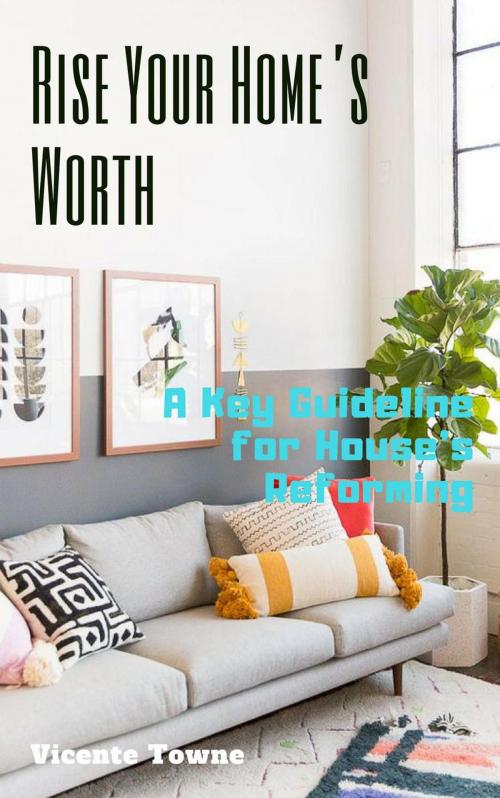Rise Your Home’s Worth A Key Guideline for House's Reforming
Nonfiction, Home & Garden, Gardening, House Plants, The Home, Cleaning & Caretaking, Crafts & Hobbies| Author: | Vicente Towne | ISBN: | 9781386951315 |
| Publisher: | Thang Nguyen | Publication: | July 8, 2018 |
| Imprint: | Language: | English |
| Author: | Vicente Towne |
| ISBN: | 9781386951315 |
| Publisher: | Thang Nguyen |
| Publication: | July 8, 2018 |
| Imprint: | |
| Language: | English |
After cleaning, fixing, and prepping up your home, the next process is that you need to protect the worth of your home.
Protect Your Home Investment
Leaving on fewer fixes will prevent expensive and bigger problems down the road. Start with a plan to care for plumbing and heating on a regular schedule. Obviously, these components keep your home comfortable and habitable, but they can be quite costly to repair or replace. Keep an eye on your roof too–as this is sheltering every other investment you've made in your home. Keep a vigil lookout for water intrusions. That's not only the roof but pipes, windows, bathtubs, and showers too. Performing regular maintenance and repairing your home whether you plan to live in it for many years or sell it. Learn how to use a caulk gun. Regular upkeep will maintain the comfort, energy efficiency, and appearance of your home and it will help you to maximize its value when you're ready to sell it.
Support your neighbors. Take the time to assist that elderly couple to maintain their lawn and property appearance. It's okay if your motives aren't entirely altruistic, you'll still earn the good karma points and help the neighborhood look its best. If a foreclosed home or unoccupied property is hurting home values, take action. True, the bank or property owners are responsible for the upkeep of that home, but why sit back and watch it negatively impact the neighborhood. That doesn't just mean reap the out-of-control weeds or paint the ramshackle siding. You can research the property owner online or at the county courthouse. Banks and investors retain a contractor to maintain vacant homes. Share the information with your neighbors and take turns calling that bank or investor until the problem is resolved.
Take notice of taxes. Home improvements may reduce the amount of taxes you have to pay when you do sell your home. While home improvements may not be tax deductible, especially if your home is used for residence only, there may still be energy-related tax credits available. So, save all receipts.
In sum up, you should be proud that you've accomplished. All these problems contribute to the end value or results even though it seemed to be expensive, whether that's your personal enjoyment of living in your home or the final sales price of your investment. With the improvements you've made to your home, you should experience a significant increase in value provided all the projects went according to plan.
Again, I want to thank you for downloading and being patient to read this book until here. I strongly think that you do understand how to upgrading your house to become safer and more beautiful, which helps you enjoy the wonderful life. I believe you can enhance your house in a perfect way.
After cleaning, fixing, and prepping up your home, the next process is that you need to protect the worth of your home.
Protect Your Home Investment
Leaving on fewer fixes will prevent expensive and bigger problems down the road. Start with a plan to care for plumbing and heating on a regular schedule. Obviously, these components keep your home comfortable and habitable, but they can be quite costly to repair or replace. Keep an eye on your roof too–as this is sheltering every other investment you've made in your home. Keep a vigil lookout for water intrusions. That's not only the roof but pipes, windows, bathtubs, and showers too. Performing regular maintenance and repairing your home whether you plan to live in it for many years or sell it. Learn how to use a caulk gun. Regular upkeep will maintain the comfort, energy efficiency, and appearance of your home and it will help you to maximize its value when you're ready to sell it.
Support your neighbors. Take the time to assist that elderly couple to maintain their lawn and property appearance. It's okay if your motives aren't entirely altruistic, you'll still earn the good karma points and help the neighborhood look its best. If a foreclosed home or unoccupied property is hurting home values, take action. True, the bank or property owners are responsible for the upkeep of that home, but why sit back and watch it negatively impact the neighborhood. That doesn't just mean reap the out-of-control weeds or paint the ramshackle siding. You can research the property owner online or at the county courthouse. Banks and investors retain a contractor to maintain vacant homes. Share the information with your neighbors and take turns calling that bank or investor until the problem is resolved.
Take notice of taxes. Home improvements may reduce the amount of taxes you have to pay when you do sell your home. While home improvements may not be tax deductible, especially if your home is used for residence only, there may still be energy-related tax credits available. So, save all receipts.
In sum up, you should be proud that you've accomplished. All these problems contribute to the end value or results even though it seemed to be expensive, whether that's your personal enjoyment of living in your home or the final sales price of your investment. With the improvements you've made to your home, you should experience a significant increase in value provided all the projects went according to plan.
Again, I want to thank you for downloading and being patient to read this book until here. I strongly think that you do understand how to upgrading your house to become safer and more beautiful, which helps you enjoy the wonderful life. I believe you can enhance your house in a perfect way.















